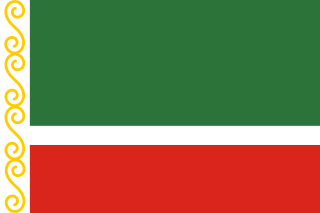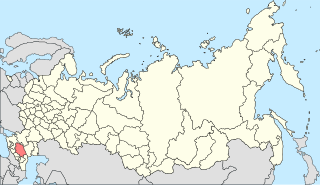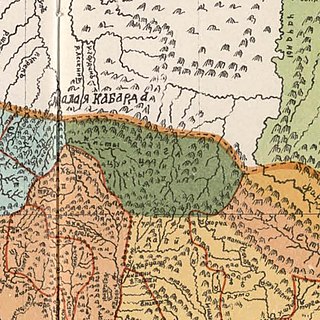Vainakh or Vaynakh may refer to:
Vainakh or Vaynakh may refer to:

Chechnya, officially the Chechen Republic, is a republic of Russia. It is situated in the North Caucasus of Eastern Europe, between the Caspian Sea and Black Sea. The republic forms a part of the North Caucasian Federal District, and shares land borders with Georgia to its south; with the Russian republics of Dagestan, Ingushetia, and North Ossetia–Alania to its east, north, and west; and with Stavropol Krai to its northwest.

The Nakh languages are a group of languages within the Northeast Caucasian family, spoken chiefly by the Chechens and Ingush in the North Caucasus.
The history of Chechnya may refer to the history of the Chechens, of their land Chechnya, or of the land of Ichkeria.
The Chechens, historically also known as Kisti and Durdzuks, are a Northeast Caucasian ethnic group of the Nakh peoples native to the North Caucasus. They are the largest ethnic group in the region and refer to themselves as Nokhchiy. The vast majority of Chechens are Muslims and live in Chechnya, an autonomous republic within the Russian Federation.
Yalkharoy is a rural locality in Urus-Martanovsky District of the Republic of Chechnya, Russia.
The Dvals were a ethnographic group of Georgians. Their lands lying on both sides of the central Greater Caucasus mountains, somewhere between the Darial and Mamison gorges. This historic territory mostly covers the north of Kartli, parts of the Racha and Khevi regions in Georgia and south of Ossetia in Russia.

The Nakh peoples are a group of North Caucasian peoples identified by their use of the Nakh languages and other cultural similarities. These are chiefly the ethnic Chechen, Ingush and Bats peoples of the North Caucasus, including closely related minor or historical groups.
The Grozny riots of 1958 occurred between 23 and 27 August that year in Grozny. Although beginning as a small-scale event, it turned a major event in the history of the city, of Chechnya and of Russo-Chechen relations, starting a series of ethnic riots, to continue until 1965.

The deportation of the Chechens and Ingush, or Ardakhar Genocide, and also known as Operation Lentil, was the Soviet forced transfer of the whole of the Vainakh populations of the North Caucasus to Central Asia on 23 February 1944, during World War II. The expulsion was ordered by NKVD chief Lavrentiy Beria after approval by Soviet leader Joseph Stalin and Anastas Mikoyan, as a part of a Soviet forced settlement program and population transfer that affected several million members of ethnic minorities in the Soviet Union between the 1930s and the 1950s.
The Vainakh peoples of the North Caucasus were Islamised comparatively late, during the early modern period, and Amjad Jaimoukha (2005) proposes to reconstruct some of the elements of their pre-Islamic religion and mythology, including traces of ancestor worship and funerary cults. The Nakh peoples, like many other peoples of the North Caucasus such as Circassians, practised tree worship, and believed that trees were the abodes of spirits. Vainakh peoples developed many rituals to serve particular kinds of trees. The pear tree held a special place in the faith of Vainakhs.
Mythology of the Caucasus is the mythologies and folklore of the various peoples of the Caucasus region.

The Vainakh languages are a dialect continuum that consists of the Chechen and Ingush languages, spoken mainly in the Russian republics of Chechnya and Ingushetia, as well as in the Chechen diaspora. Together with Bats, they form the Nakh branch of the Northeast Caucasian languages family.
The Hinukh are a people of Dagestan living in 2 villages: Genukh, Tsuntinsky District - their 'parent village' and Novomonastyrskoe, Kizlyarsky District - where they settled later and live together with Avars and Dargins and also in the cities of Dagestan. They are being assimilated by the Caucasian Avars.

Caucas or Kavkasos was the supposed ancestor of Vainakh peoples according to The Georgian Chronicles. His story is narrated in the compilation of the medieval Georgian chronicles, Kartlis Tskhovreba, taken down from oral tradition by Leonti Mroveli in the 11th century. The legend has it that he was a son of Targamos and, thus, brother of Hayk, Movakos, Lekos, Heros, Kartlos, and Egros.
FC Vaynakh Shali was a Russian football team from Shali. It played professionally in 1991 and 1992. Their best result was 20th place in the Zone 1 of the Russian Second Division in 1992.
Pkharmat is a legendary hero of the Vainakh people who stole fire for mankind, thus allowing them to forge metal, cook food, and light their homes, and uniting the people into a nation. For this Pkharmat was punished by being chained to Mount Kazbek. Pkharmat is the Vainakh equivalent of the Greek hero Prometheus and the Georgian hero Amirani, among others.
Pimenov (masculine) or Pimenova (feminine) is a surname of Russian origin. People with the surname include:

On 26 May 2010, at least seven people were killed in a bomb blast in Stavropol, Russia. At least 40 people were injured, one from Moscow, while another is an outsider, and another from Azerbaijan or Turkey. The blast occurred before a concert.
During the 13th and 14th centuries, the Mongols launched two long, massive invasions of the territory of modern Chechnya and Ingushetia, which included the lands of Alania in the west, Simsir in the northeast, and the Georgian-allied polity of Durdzuketia in the south. They caused massive destruction and human death for the Durdzuks, but also greatly shaped the people they became afterward. However, this came at great cost to them, and the states they had built were utterly destroyed, as were their previous organized systems. These invasions are among the most significant occurrences in Chechen and Ingush history, and have had long-ranging effects on Chechnya, Ingushetia and their peoples.

The Durdzuks, also known as Dzurdzuks, was a medieval exonym of the 9th-18th centuries used mainly in Georgian, Arabic, but also Armenian sources in reference to the Vainakh peoples.